What It’s Like to Be a Woman of Color in Architecture
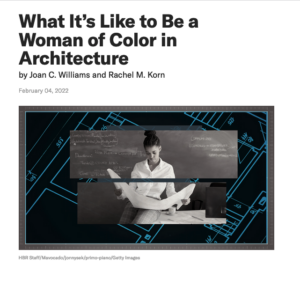 Read our latest article in the Harvard Business Review on “What It’s Like to Be a Woman of Color in Architecture” with data from our study of gender and racial bias in the architecture profession.
Read our latest article in the Harvard Business Review on “What It’s Like to Be a Woman of Color in Architecture” with data from our study of gender and racial bias in the architecture profession.
WorkLife Law Featured on the New York Times 2021 Holiday Giving Guide
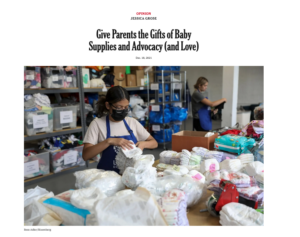 WorkLife Law is honored to be featured in the New York Times Opinion 2021 Holiday Gift Giving Guide amongst this list of amazing organizations united in their missions to help mothers during these trying times.
WorkLife Law is honored to be featured in the New York Times Opinion 2021 Holiday Gift Giving Guide amongst this list of amazing organizations united in their missions to help mothers during these trying times.
Op-ed: How the Return to Office Work Is Impoverishing the Middle Class
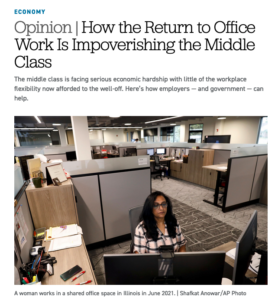 Read Work Life Law Director Joan C. William’s op-ed in Politico highlighting the financial hardship many middle-income workers are experiencing due a lack of workplace flexibility that is becoming increasingly available to higher-income workers. The piece discusses the long-term implications of blanket return-to-office policies for gender and racial equality as well as employer and government policies that can make a difference.
Read Work Life Law Director Joan C. William’s op-ed in Politico highlighting the financial hardship many middle-income workers are experiencing due a lack of workplace flexibility that is becoming increasingly available to higher-income workers. The piece discusses the long-term implications of blanket return-to-office policies for gender and racial equality as well as employer and government policies that can make a difference.
New Report: The Elephant in the (Well-Designed) Room: An Investigation into Bias in the Architecture Profession
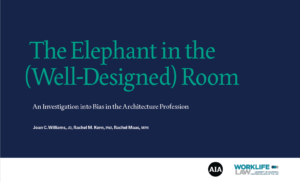 We found an elephant in the room: white men are having a different experience than all other groups in architecture workplaces. Women of color reported the worst experiences overall, with white women and men of color falling in between. Read the full report here.
We found an elephant in the room: white men are having a different experience than all other groups in architecture workplaces. Women of color reported the worst experiences overall, with white women and men of color falling in between. Read the full report here.
The problem is real, but so is the solution. Our report includes Bias Interrupters toolkits for interrupting bias in hiring, assignments, performance evaluations, meetings, family leave and workplace flexibility.
WorkLife Law Releases New Advocacy Toolkit for Winning New Rights for Lactating Workers
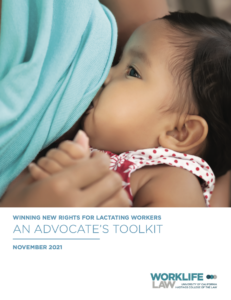 Legal rights for lactating workers are important – for maternal and child health, health equity, family economic security, and the fair treatment of women in the workplace. This policy advocacy toolkit has everything you need from model statutory language to messaging and strategy tips.
Legal rights for lactating workers are important – for maternal and child health, health equity, family economic security, and the fair treatment of women in the workplace. This policy advocacy toolkit has everything you need from model statutory language to messaging and strategy tips.
WorkLife Law Cares: GoFund Me Campaign
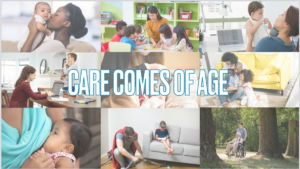 Our “Care Comes of Age” GoFundMe campaign is both a celebration of the progress we’ve made to advance the workplace rights of family caregivers over the last 25 years and a call to action to ensure this pivotal moment produces lasting change. Your generous support enables us to continue this critical work to advance legal protections for family caregivers. Read our Annual Newsletter here.
Our “Care Comes of Age” GoFundMe campaign is both a celebration of the progress we’ve made to advance the workplace rights of family caregivers over the last 25 years and a call to action to ensure this pivotal moment produces lasting change. Your generous support enables us to continue this critical work to advance legal protections for family caregivers. Read our Annual Newsletter here.
A Message of Hope for Breastfeeding Workers from Staff Attorney Jessica Lee
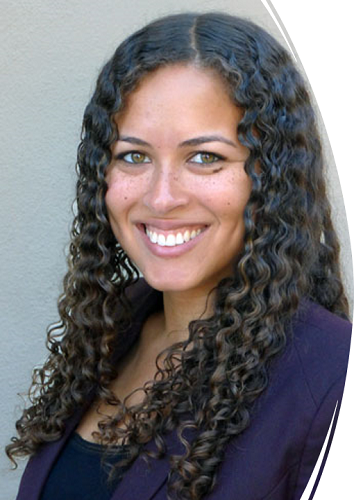
At the U.S. Breastfeeding Committee biannual Membership Meeting, WorkLife Law staff attorney Jessica Lee addressed USBC’s 100+ member organizations, who are working collaboratively to drive policy and practice changes that create a landscape of breastfeeding support. Watch Jessica’s inspiring “Mission Moment” — acknowledging both the struggles of this unprecedented time and the hope on the horizon for working families. As Jessica says, “We’re close to seeing some of the biggest changes and advances in racial equity in maternal and infant health in a decade, if not a generation…The PUMP Act, and so many of the efforts that give me hope, have only happened because of the community fostered here at the USBC. You bring our diverse experiences and skills together to make a beautiful and strong force working on behalf of families.”
PUMP for Nursing Mothers Act Passes with Bipartisan Support in U.S. House of Representatives

WorkLife Law Launches Dar a Luz to Empower Farmworkers in Pregnancy and Postpartum
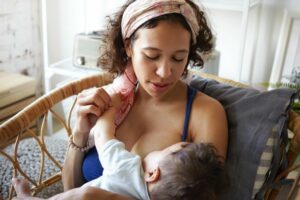 In 2019, WorkLife Law advocated with California’s Employment Development Department (EDD), which administers the state’s worker-funded State Disability Insurance (SDI), to ensure that farmworkers could access critical paid leave early in pregnancy. Dar a Luz, a collaboration with the Central Coast Alliance United for a Sustainable Economy (CAUSE), continues this critical effort to support and empower farmworkers who need paid time off work to avoid harmful exposure to agricultural toxins during pregnancy, and the postpartum and nursing period.
In 2019, WorkLife Law advocated with California’s Employment Development Department (EDD), which administers the state’s worker-funded State Disability Insurance (SDI), to ensure that farmworkers could access critical paid leave early in pregnancy. Dar a Luz, a collaboration with the Central Coast Alliance United for a Sustainable Economy (CAUSE), continues this critical effort to support and empower farmworkers who need paid time off work to avoid harmful exposure to agricultural toxins during pregnancy, and the postpartum and nursing period.
New Toolkit on Centering Pregnant and Parenting Students in the Transition Back to Campus
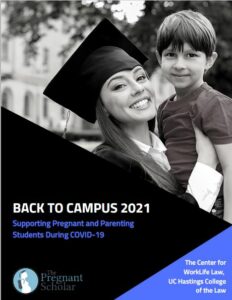 As the U.S. heads into the second fall of the COVID-19 pandemic, millions of student parents enrolled in college are returning to in person instruction at the same time as their children. The new toolkit from the Center for WorkLife Law’s Pregnant Scholar Initiative offers concrete guidance on how to return to on-campus instruction in a way is inclusive of pregnant and parenting students.
As the U.S. heads into the second fall of the COVID-19 pandemic, millions of student parents enrolled in college are returning to in person instruction at the same time as their children. The new toolkit from the Center for WorkLife Law’s Pregnant Scholar Initiative offers concrete guidance on how to return to on-campus instruction in a way is inclusive of pregnant and parenting students.